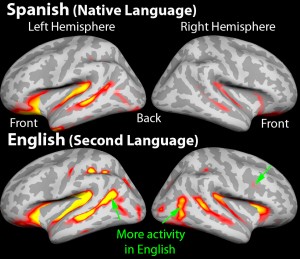Study looks at the bilingual brain

A UCSD study is trying to find out how the brain works in the learning of a second language, and researchers are currently recruiting for Spanish-dominant bilingual persons to participate.
Matt Leonard, a Ph.D Candidate at the Department of Cognitive Science and lead researcher in the study, said that, generally speaking, they are interested in how it’s possible for the human brain to organize and process multiple languages.
“It’s already pretty amazing that we can fully master a single language, but it’s even more incredible that we’re capable of learning two or even more,” Leonard said.
For the study, researchers use new non-invasive technologies called magnetoencephalography (MEG) and magnetic resonance imaging (MRI) to figure out which parts of the brain process words in each of a bilingual’s languages, and researchers have the ability to see how this brain activity changes over time millisecond by millisecond. These techniques are both completely non-invasive and do not involve any chemicals or radiation.
Leonard said that this study, which has been going on for three years, is “particularly interested in how the brain processes languages that are less proficient.”
As an example, he said that a person who is a native Spanish speaker who is learning English will use different brain regions for the two languages, especially if their English is not as good.
“In general, we found that in the less proficient language, the brain recruits many more areas than are involved in processing the dominant language,” he said. Research Assistant Christina Torres said that it is often difficult recruiting Latinos for the study.
“I think that a lot of people don’t feel comfortable and it is also difficult to get the word out,” she said.
Torres, who recently graduated from UCSD, said that she’s been recruiting study participants from community colleges, churches, ESL classes, and community centers.
Among the criteria for the study are:
-Native language: Spanish; Second language: English
– 18-30 years old
– Male or Female
– Right handed
– No history of neurological or psychological impairment
The study pays $20 per hour, and transportation could be arranged for participants to go to UCSD.
The study has several benefits, especially for those who support bilingualism.
“Especially in a place like Southern California, it’s very important to understand what it means to have two languages in your head,” said Eric Halgren, Professor of Radiology and Neurosciences and Co-director Multimodal Imaging Laboratory at UCSD. “This is true when it comes to setting up and maintaining bilingual classes in schools, providing services for people in more than one language, and it even extends to more serious health-related issues.”
Another of the benefits of the study is that it would help to find techniques that would make it easier to learn another language by understanding how regions of the brain work in second-language acquisition, he said.
“Bilingualism is becoming more mainstream. I think children should be encouraged by the educational system to learn multiple languages,” Leonard said.
The researcher said he’s very interested in getting more Latinos involved in science research.
“My ultimate goal is to help create a sustainable relationship between institutions like UCSD and the Latino community, which will bring about greater trust among the various groups and also get people excited about science,” he said.
People interested in participating can email us at recruit1@ucsd.edu or call us at (858) 822-1818.






